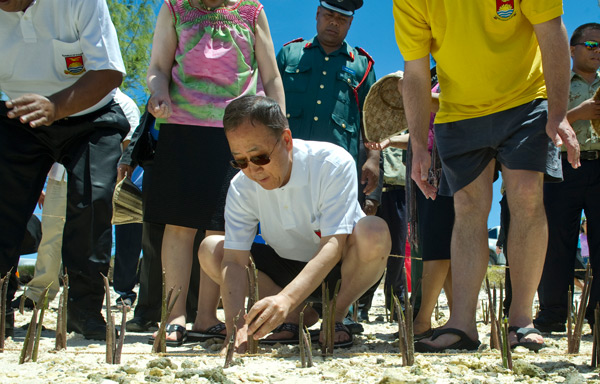Small Island Developing States and the UN - timeline

Secretary-General Ban Ki-moon plants Mangroves on Kiribati. Mangroves help to protect against the rising sea levels caused by climate change. Photo: Eskinder Debebe
Who are the Small Island Developing States?
Africa, Indian Ocean and South China Sea
- Cape Verde
- Comoros
- Guinea Bissau
- Maldives
- Mauritius
- São Tomé and Principe
- Seychelles
- Singapore
Caribbean
- Antigua and Barbuda
- Bahamas
- Barbados
- Belize
- Cuba
- Dominica
- Dominican Republic
- Grenada
- Guyana
- Haiti
- Jamaica
- Saint Kitts and Nevis
- Saint Lucia
- Saint Vincent and the Grenadines
- Suriname
- Trinidad and Tobago
Pacific
- Cook Islands
- Fiji
- Kiribati
- Marshall Islands
- Micronesia
- Nauru
- Niue
- Palau
- Papua New Guinea
- Samoa
- Solomon Islands
- Timor-Leste
- Tonga
- Tuvalu
- Vanuatu
Timeline
June 1992
Small Island Developing States are first recognized as a distinct group of countries at the UN Conference on Environment and Development in Rio de Janeiro. One hundred and seventy nine nations acknowledged that "small island developing states are a special case both for environment and development ... [and] are considered extremely vulnerable to global warming and sea level rise."
April 1994
UN Global Conference on the Sustainable Development of Small Island Developing States adopts the Barbados Programme of Action. The Programme sets forth specific actions and measures at the national, regional and international levels in support of the Small Island Developing States.
Some of the action areas are: climate change and sea- level rise, natural and environmental disasters, energy resources, tourism, biodiversity, marine resources, transport and communication, and science and technology.
September 1999
The United Nations General Assembly holds a special session to appraise five years of progress on the implementation of the Barbados Programme. The Assembly recognized progress as ‘uneven’ and identified key trends affecting small islands such as increasing globalization, widening inequalities in income and a continued deterioration of the global environment.
It also warned that rising sea levels could submerge some low-lying island nations and stressed the importance of resilience and preparedness in the face of natural disasters.
The Assembly pointed to priority areas to act on such as improving freshwater resources, developing solar and renewable energy to lessen dependence on expensive imported oil and managing tourism growth to protect the environment and cultural integrity.
September 2002
At the World Summit on Sustainable Development, countries reaffirm the special case of Small Island Developing States and highlight a series of specific issues in the Johannesburg Plan of Action such as vulnerability to climate change.
January 2005
The International community convenes in Port Louis, Mauritius, to discuss the implementation of the Barbados Programme. The meeting adopts both the Mauritius Strategy to further implement the programme of action, and the Mauritius Declaration.
The Mauritius Strategy sets forth actions in 19 priority areas intended to support small islands in achieving internationally agreed targets and goals, such as the Millennium Development Goals.
The Mauritius Declaration recognizes that particular attention should be given to building resilience in Small Island developing States, including through technology transfer and development, capacity-building and human resource development.
September 2010
The General Assembly undertakes a 5-year review of the Mauritius Strategy (MSI) for the Further Implementation of the BPOA, pursuant to UN General Assembly Resolutions 63/213 and 64/199.
December 2012
The General Assembly designates 2014 as the “International year of Small Island Developing States.”
September 2014
The Third International Conference on Small Island Developing States will be held in Apia, Samoa, and will focus partnerships.
